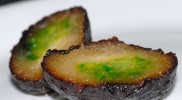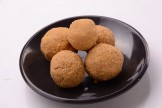These sweet wontons originate from the Cantonese region, and traditionally stuffed with d...

Kala Jamun-Black is beautiful as you will see when you fry regular gulab jamun till they ...
This is a rich, delicious and luxurious dessert is a great comfort food on a cold winter'...

This easy to make corn ladoo liked by kids. It is perfect as an after-dinner dessert or ...
High power traditional indian sweet, packed with nutrients and goodness of nuts....
Fruitcake is a cake made with chopped dried fruit, nuts, and spices. It is a heavy, dense...
Rava Cake, popularly known as Basbousa are small cakes made of semolina soaked in simple syrup.
Rava Cake popularly known as Basbousa is a well-known sweet semolina cake throughout the Middle Eastern region. Basbousa is deliciously made with semolina, egg , desiccated &nbs... Read More..
About Recipe
Rava methai, inippu, Rabha rava Misti |
|||||||||||||||||||||||||||||||||||||||||||||
|
|||||||||||||||||||||||||||||||||||||||||||||
Rava Cake popularly known as Basbousa is a well-known sweet semolina cake throughout the Middle Eastern region. Basbousa is deliciously made with semolina, egg , desiccated coconut, butter combined together; flavoured with little almond essence baked in a large tray, cut into diamond shaped with an almond place on each piece and finally soaked with some sweet syrup and rose water.
Basbousa or sweet semolina cake flavoured with rose water and lemon syrup is very popular in Egypt. This sweet cake is also known by various names such as Herissa in Alexandria, Namoura in Syria or Revani in Turkey and Greece. There are various variations of making this wonderful and delicious sweet. This dish has always been one of the most indispensable, easy to prepare, delectable desserts prepared for Ramadan.
The sweet cake as such is not very sweet but enhances the sweetness by soaking it with sugar syrup scented with rose water. Basbousa is a very classic dessert in the Middle Eastern countries as well as the countries along the Eastern Mediterranean areas. Rava cake is very easy to prepare and serving is a no fuss dessert. Kids will love eating this dessert for its appearance and aroma.
Coconut is a popular addition in making of the Rava cake. The syrup can optionally contain any flavour of your choice either orange flower water or rose water. Some traditional recipes replace yogurt with eggs. Pastusha is a brilliant variant of Basbousa that originated in Kuwait and like basbousa is made of semolina soaked in sweet syrup. It is mainly characterized by the addition of finely ground pistachios and orange flower water.
Rava cake can be somewhat a type of halwa; cooked in a different method giving different variations and flavours. This dessert is generally very tasty, light and can adjust the quantity of sugar according to your taste. Semolina/ Sooji Semolina is commonly known as Sooji or Bombay Rava. It is a very versatile ingredient in Indian cooking used for preparing a variety of savoury and sweet dishes.
Semolina is very gritty, coarse texture type of flour usually made from wheat. It contains the nutritious heart (endosperm) of the grain, which is left behind during milling when the finer flour is sifted. Semolina is milled to various grades of coarseness such as soft wheat or hard wheat (the durum variety). The latter variety is generally used for making gnocchi, pasta etc.
Semolina is also mixed with regular flour in certain cakes and biscuits to give a crisp, crunchy texture especially with shortbreads. Recipes from Semolina Semolina is a vital ingredient in the south Indian cuisine used for preparing a variety dishes like Upma, Sooji ka halwa or kesari halwa or sheera (a softly sweet dessert made with semolina cooked in milk or water flavoured with saffron and garnished with lots of nuts), Rava Ladoo, Sweet Semolina Poori, Semolina cake, Semolina Manda, Rava dosa (savoury pancake made with sooji), Crispy fish fry with semolina etc.
Semolina is sometimes used to coat slices of fish before it is pan fried in oil which helps in giving crispiness to the fish.
How to make Rave Cake – Basbousa:
Ingredients:
All-purpose flour - ½ cup
Semolina (Rava) - 1 ¼ cup
Desiccated coconut - 1 ½ cup
Almond essence - 3 drops
Baking powder - 1 tsp
Butter, melted - 110 gms
Egg - 1 no
Lemon juice for syrup - ½ tsp
Milk - 1 cup
Rose water - 1 tsp
Saffron - ½ gm
Sugar - ¾ cup
Sugar for syrup - 1 ½ cup
Water for syrup - 1 ½ cup
Directions:
Take a bowl and add semolina, desiccated coconut, all-purpose flour, sugar, baking powder, butter, egg, milk with saffron, almond essence and mix all ingredients to make soft dough. Put the dough into an oven proof casserole and level it nicely and lightly pre-cut the top of the Basbousa as per your desired shape. Bake the Rava cake at 190 degree C for 40 minutes till it turns golden in colour on the top.
For making sugar syrup: Heat a pan and add sugar, water, lemon juice and allow boiling for 5 minutes and then add rose water. Pour the sugar syrup over the basbousa and arrange almonds on each diamond cut. Place the dish again in the oven for another 15 minutes and bake until done. Rava cake is a luscious, appealing and mouth-watering sweet dessert, easy to prepare and good for kids. Do try this wonderful variation and enjoy the innovative flavours. Watch and enjoy the making of Rava cake at:
https://www.vahrehvah.com/rava-cake-basbousa




Serkan E Posted on Fri Jun 14 2013
Waawaa wiwwaaaa, my mother makes this too it's super yummy (Y)
Reply 0 - Replies


Yashwini3 Posted on Fri Jun 14 2013
hi chef, looks very yummy, but will it taste good without egg in the halwa.
Reply 0 - Replies
SMPwhiteshadow Posted on Fri Jun 14 2013
I dont think u saw vahchef skin color and accent... i think its a low chance, realy low chance, he may not be russian or any or white country ...
Reply 0 - Replies
sean wilson Posted on Fri Jun 14 2013
you can't have dairy or something? why no egg?
Reply 0 - Replies
Tassycrafty Posted on Fri Jun 14 2013
Omg, i made this last week but i used yogurt and cream and butter. It was really good... Hmm hmm hmmm X3! :) will try this one as well. Thank you.
Reply 0 - Replies
 Easy recipes
Easy recipes
 Healthy Recipes
Healthy Recipes
 Dessert Recipes
Dessert Recipes
 Mutton and Lamb
Mutton and Lamb  Indian Bread Recipes
Indian Bread Recipes
 Dal Recipes
Dal Recipes
 Chutney and Pickles
Chutney and Pickles  Indo-Chinese Recipes
Indo-Chinese Recipes
 Snacks and Appetizers
Snacks and Appetizers
 Low Fat Recipes
Low Fat Recipes
 Chaat Recipes
Chaat Recipes
 Biryani and Rice
Biryani and Rice  Curry Recipes
Curry Recipes
 Indian Sweet Recipes
Indian Sweet Recipes
 Egg Recipes
Egg Recipes
 Paneer Recipes
Paneer Recipes
 Chicken Recipes
Chicken Recipes
 Indian tiffins
Indian tiffins
 Egg less Recipes
Egg less Recipes
 Soups and Salads
Soups and Salads
 Indian Sea Food
Indian Sea Food
 Manchurian Recipes
Manchurian Recipes
 Indian Drinks Recipes
Indian Drinks Recipes
 Dinner Recipes
Dinner Recipes
kanan1525 Posted on Fri Jun 14 2013
wow first again
Reply 0 - Replies